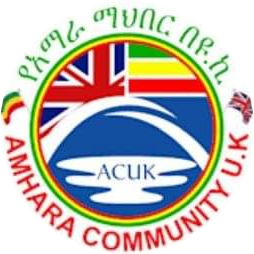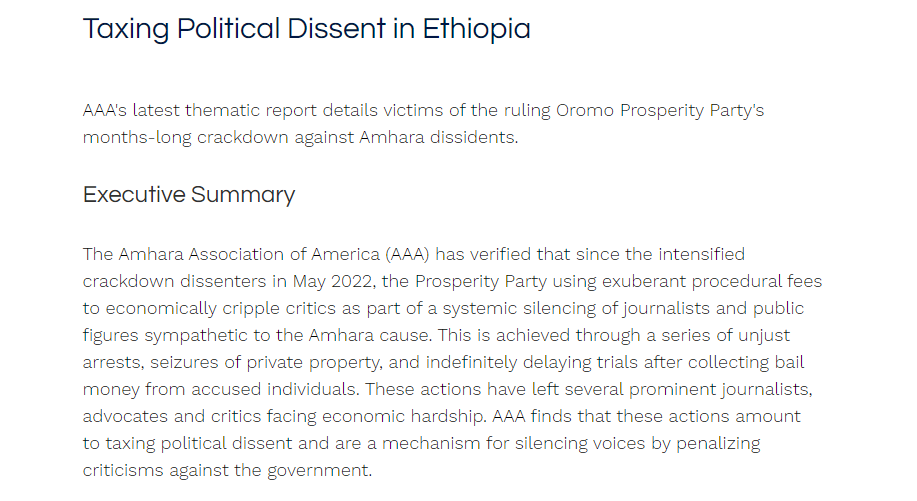AAA’s latest thematic report details victims of the ruling Oromo Prosperity Party’s months-long crackdown against Amhara dissidents.
Executive Summary
The Amhara Association of America (AAA) has verified that since the intensified crackdown dissenters in May 2022, the Prosperity Party using exuberant procedural fees to economically cripple critics as part of a systemic silencing of journalists and public figures sympathetic to the Amhara cause. This is achieved through a series of unjust arrests, seizures of private property, and indefinitely delaying trials after collecting bail money from accused individuals. These actions have left several prominent journalists, advocates and critics facing economic hardship. AAA finds that these actions amount to taxing political dissent and are a mechanism for silencing voices by penalizing criticisms against the government.
Individual cases reflected in this report are based on firsthand information from victims. AAA’s investigators interviewed 10 journalists, activists, and public figures during preparation of this report. All interviews show that victims were arbitrarily arrested without due process and legitimate accusations. The bail money set by authorities was disproportionate to the alleged crimes and circumstances of the individuals. Authorities also seized private cell phones, computers, and other electronic devices of victims without court orders. There was also a failure to guarantee a speedy trial, establish a formal charge, or return bail money to released individuals.
Political Context
In 2018, when Prime Minister Abiy Ahmed Ali first came into power, the conditions of human and civil rights in Ethiopia seemed to have improved for a brief period. Especially freedom of expression for political parties, activists, and journalists. The public witnessed the release of hundreds of journalists, activists, and other prisoners of conscience. Prime Minister Abiy came into power following mass protests among the Amhara, Oromo and other communities of Ethiopia which ousted the Tigray People’s Liberation Front (TPLF) from central power. However, political power in the country shifted from the TPLF-led Ethiopian People’s Revolutionary Democratic Front (EPRDF) to the Oromia Prosperity Party (OPP) [also known as the Oromo People’s Democratic Organization; OPDO].
Not long after, Prosperity Party officials started unlawfully detaining journalists, activists, opposition party members, and human rights advocates. In 2022, there was a major crackdown on students, teachers, journalists, health professionals, community leaders, and other prominent influencers who spoke out against injustices committed against Amhara people across Ethiopia. The crackdown was especially targeted towards those engaged in bringing awareness to the ongoing Amhara Genocide in the Oromia, Benishangul-Gumuz and other Regions and the persecution of Amhara civilians by Tigrayan militias in Northern Ethiopia. Unlawfully detained individuals were kept in jails for long periods without formal charges. Beatings and insults from security personnel were common. Security officials also implemented third-degree methods of interrogation on detained victims.
The main purpose of this report is not to expose all human rights violations perpetrated by government security agents against arrested individuals. Rather, this report aims to disclose the government’s measure of taxing political dissent. The taxes are applied in the form of excessive bail and sometimes by directly seizing properties belonging to the
accused without due process of the court.

